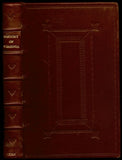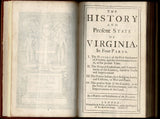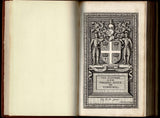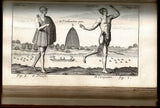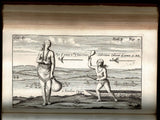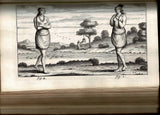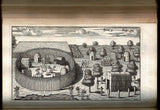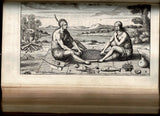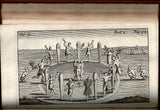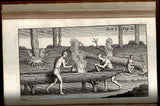The History and Present State of Virginia, in four parts . By a native and inhabitant of the place
Author: Robert Beverley Jr (1667-1722)
Year: 1705
Publisher: Printed for R. Parker
Place: London
Description:
[12]+19+[errata+104+40+64+83 pages with engraved frontispiece, fourteen engraved plates, all by Gribelin and folding letterpress table. Small octavo (7 1/2" x 4 3/4") bound in contemporary style leather with five raised spine bands with gilt lettering to spine and blind stamped decorative cover. ( Church 821; European Americana, 705/21; Field 122 (later edition); Howes B410; Pilling, Algonquian, p. 43; Sabin 5112; Streeter sale 2:1098; Vail 297) First edition.
Robert Beverley, best known, as author of The History and Present State of Virginia, In Four Parts (1705), the first published history of a British colony by a native of North America. Beverley worked as a clerk in Jamestown using family connections to advance politically while acquiring substantial wealth. In 1703 he sailed to England to appeal a suit he lost before the General Court, and there he penned his history, a collection of personal history, official accounts, and material borrowed from others. Beverley self-consciously identified himself as a Virginian and used the books to settle political scores. In particular, he was highly critical of Lieutenant Governor Francis Nicholson, who made sure that Beverley lost his positions as clerk of the House of Burgesses and of King and Queen County. In his later years, Beverley retired to his large estate, Beverley Park, where he experimented with wine-making.
When Beverley lost his case in London, he authored a number of letters back to Virginia that especially angered Nicholson. “As to Mr. Beverley’s letter and narrative,” declared Nicholson, “they are part false, part scandalous, & part Malitious, but I could not expect otherwise from a man of his universal ill character.” While in England Beverley also wrote The History and Present State of Virginia, In Four Parts (1705), the first published history of a British colony by a native of North America. Beverley recalled later that he had reviewed for a bookseller “about six pages of paper written, which contained the account of Virginia and Carolina.” But “the account was too faulty and too imperfect to be mended,” so he proposed to the bookseller to “make him an account of my own country.” Three French-language editions were published between 1707 and 1718, probably as promotional literature to be distributed to Protestants in French-speaking portions of Europe.
When it first appeared in London, the book was three hundred pages of text, accompanied by fourteen engravings, and divided into four sections: “The History of the First Settlement of Virginia,” “The Natural Productions and Conveniencies of the Country,” “The Native Indians,” and “The present State of the Country.” It is an unmatched source for the Virginia of its time—an amalgam of personal observations and stories heard, material borrowed from published and unpublished accounts, and official reports. He also included significant portions from the unpublished writings of several other Virginians. The early section of the history relied heavily on Captain John Smith's writings, but the later sections on politics, Native Americans and the flora, fauna, and agricultural products of the colony used several sources.
No prior author identified himself so clearly as a Virginian. “I am an Indian, and don’t pretend to be exact in my language,” Beverley wrote in the preface. “But I hope the Plainness of my Dress, will give him [the reader] the kinder Impressions of my Honesty, which is what I pretend to.” His treatment of Bacon's Rebellion (1676–1677) clearly reflected his father’s loyalty to Governor Sir William Berkeley. The History was also sharply critical of Nicholson, including the governor’s transfer of the capital from Jamestown, where Beverley owned property, to the “imaginary City” of Williamsburg. Before leaving London, Beverley participated in the campaign against the governor that led to Nicholson’s recall at about the same time that the History was printed.
Condition:
Previous owner's book plate to front pastedown, number stamp to A2. Rebound else better than very good.











